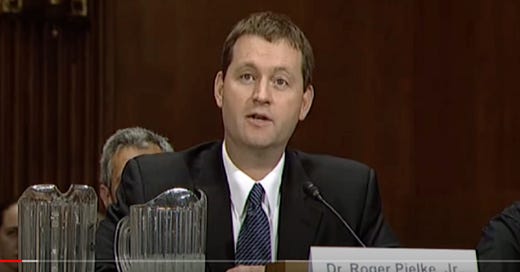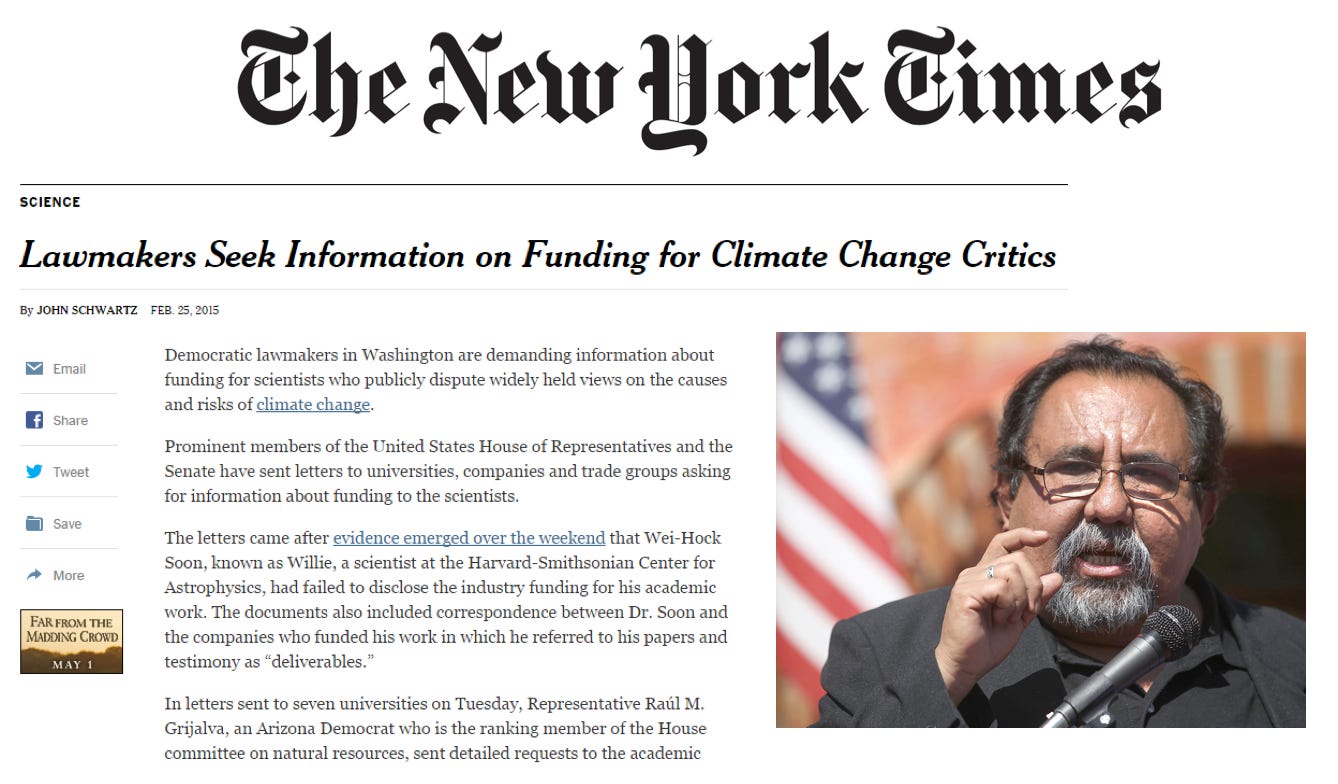This week, I’m grateful for the opportunity to participate in a conference in Brussels on “science advice under pressure,” organized by the European Commission’s Science Advisory Mechanism (it is streaming online if you’d like to join in today and tomorrow). I am on a panel today with Anne Glover (former science advisor to the European Commission), Matthew Flinders (University of Sheffield) and Lara Pivodic (Vrije Universiteit Brussels). Our moderator has asked us to begin today’s conversation by answering the following question:
What are your experiences (either personal or among colleagues) of coming under pressure and facing hostility a result of being a prominent science advisor giving advice in public?
As I have considered this question, my first response was: Have a seat, grab a cup of coffee, and how much time do you have?
But in today’s session I’ll only be able to give a headline response to this interesting prompt, so in this post I’ll provide some additional details on some of my experiences behind the headline. Together with my scholarship, these experiences have led me to conclude that we in the scientific community need to do a much better job creating institutions of expert advice that are robust to political challenges from both outside and inside the professional communities of experts. I’ll have more to say on this today and tomorrow at the conference and in subsequent posts
Now to the experiences I’ll share today.
Back in 2013 I was invited to give testimony before the U.S. Senate on what the most recent IPCC and U.S. National Assessment reports said about disasters and extreme events, a subject I had studied since the early 1990s. For those familiar with the framework of The Honest Broker, I took on the perspective of a “science arbiter.” You can read my written testimony here (in PDF) and watch my opening statement below, posted by someone on YouTube. Expert congressional testimony would not seem to be the sort of content to go viral, but this did, reaching over 400,000 views in short order.
My testimony — which was straight out of the IPCC and USNCA, two assessment mechanisms I have long supported — also emphasized the fact that “Humans influence the climate system in profound ways, including through the emission of carbon dioxide via the combustion of fossil fuels.” This was all mainstream science supporting aggressive, evidence-grounded policies in response to the very real risks of climate change.
I assume that my testimony went viral because most people are surprised to learn what the IPCC actually said then (and still says today) about trends in various types of weather extremes. I was (and still am) among the world’s most cited researchers on the subject, and even though I was not associated with the IPCC or the USNCA, I brought a lot of legitimacy to the issue. That legitimacy also made me a target.
A few months after my testimony, President Obama’s science advisor John Holdren testified before the same Senate Committee (pictured below). During the questions and answers with the senators Dr. Holdren got a little forward on his skis (as we say in Colorado) when discussing extreme weather events, departing in his claims a great deal from the conclusions of the IPCC. A senator at the hearing immediately called out Dr. Holdren on his statements at odds with the findings of IPCC and USNCA, and the senator pointed to my recent overview of the IPCC report before the same committee a few months earlier as contrary evidence.
Dr. Holdren apparently panicked, and instead of trying to address the scientific substance of the question, decided to go after me personally in his response. Following the hearing, I also responded to Dr. Holdren by email (who I knew from his visit to my university in 2012 as the keynote speaker celebrating the 10th anniversary of the science policy center I had founded ) which I posted on my widely-read blog. That may have been an unwise move.
Not long after this exchange, and much to my surprise, Dr. Holdren posted a strange rant about me on the website of the White House. It read like the sort of thing you’d see on Facebook from your odd uncle. But it was on the website of President Obama’s White House.
In fact, to my knowledge this is the first and only time since the position of science advisor to the U.S. president was created in the 1950s that the president’s science advisor has used his position to attack an individual researcher, using the full legitimacy and authority of the White House. Lucky me. In terms of its effects, the substance of Dr. Holdren’s attack was far less important than the fact that it came from the White House. The professional repercussions for me were immediate.
But my run-in with the White House was just the start.
Less than a year later, a member of Congress, Rep. Raul Grijalva (D-AZ) issued a press release announcing that I (and six other university faculty) were under investigation, accused of secretly taking money from fossil fuel companies in exchange for testimony like that I had given before the Senate the year before. In his letter to my university president, Rep. Grijalva specifically cited Dr. Holdren’s missive of misinformation that was on the White House website as evidence of my likely guilt. You can see Rep. Grijalva’s letter to my university and the relevant excerpt citing Dr. Holdren below.
So began what turned out to be years of disruption in my career and personal life. I suppose that was the point. Of course I have never taken money from fossil fuel companies, as concluded by the subsequent investigation. But it was the allegation that stuck. Immediately after the Grijalva investigation was announced, I was disinvited from just about every talk I had been invited to related to climate (I used to give many every year, but very few since). Colleagues stopped collaborating with me, reporters stopped calling, fellow faculty at Colorado told me that working with me was too risky and a federal agency program officer told me (off record) not to bother submitting any more grant proposals — I was just too controversial.
In fact, at my university no one (other than campus lawyers) spoke to me at all during the entire investigation, to offer support or anything else. I was isolated and unsupported. One close colleague explained, “I wish I could help, but I don’t want them coming after me.” I ultimately was pushed out of directing the successful science policy center I had founded and a few years later the university would shut it down (you can read more details here). I decided to leave climate research for several years to pursue other research interests, which turned out quitely positive for me. Fortunately, I have both academic tenure and a stubborn streak.
When the Grijalva investigation was completed, I was of course fully exonerated, but by that time everyone — including Rep. Grijalva and Dr. Holdren — had moved on. Their work had been done long before. The announcement of the investigation made the New York Times, its resolution did not.
For me, the experiences underscored the fact that an expert — even one of the most published and cited in his area of expertise, with viral Congressional videos and a widely-read social media presence — is simply no match for the White House and Congress. Experts are vulnerable targets when politicians decide to go on the attack, perhaps explaining the ease with which politicians seem to target experts. We have of course seen delegitimization in action during the pandemic with experts with far more visibility and influence than I ever will have, such as in the experiences of Dr. Anthony Fauci and the Trump Administration, which was never shy it its efforts to delegitimize expertise.
An important lesson I have taken from my experiences and reinforced by my research (most recently on science advice in the pandemic) is the importance of robust science advisory institutions — to shelter advice and advisors from politicians aiming to delegitimize, but also from ourselves. I’ll have more on to say on these issues in a subsequent post.
For me, my professional recovery was given a big assist when it was revealed in 2016 (via the Hillary Clinton Wikileaks, no less) that I had been the target of a many-years-long campaign of delegitimization funded by a billionaire and waged by one of the most powerful political organizations in Washington, DC. But that is a story that will have to await another time.








Disgusting pieces of garbage, sorry this happened to you.
The dishonesty of politicians who use their power to attack individuals like Dr Pielke is corrosive to our freedom to debate openly. The IPCC report, which is used repeatedly to shout out the impact of humans on climate , as he testified, stated those facts. His testimony was true. Too bad they probably never read the IPCC report. Too bad we don’t have honest gatekeepers and dishonest press like the NYTimes.